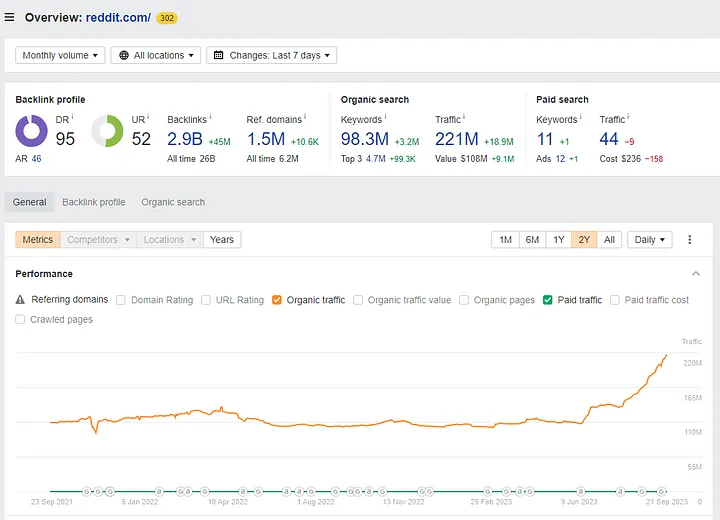
Introduction
In the ever-changing landscape of search engine algorithms, Google’s updates often have a profound impact on websites and online content creators. In recent times, there has been growing concern among independent bloggers about the effects of Google’s latest update on their visibility and traffic. This blog post aims to delve into the potential challenges faced by independent bloggers as a result of Google’s update and discuss possible strategies to navigate these changes.
Understanding Google’s Update
Google frequently updates its search algorithms to improve the quality and relevance of search results. These updates aim to enhance the user experience by prioritizing high-quality content and penalizing websites that employ manipulative tactics or engage in spammy practices. While these updates are designed with good intentions, they can inadvertently impact certain websites, including independent blogs.
Impact on Independent Bloggers
Search Engine Ranking
Independent bloggers heavily rely on organic search traffic to drive visitors to their websites. With Google’s update, changes in search engine rankings can significantly affect the visibility of their blogs. If their blogs were previously ranking well, they may experience a sudden drop in rankings, leading to a decrease in organic traffic and audience reach.
Competition with Established Websites
Independent bloggers often compete with established websites that have a stronger online presence and greater resources. Google’s update may further amplify this competition, making it harder for independent bloggers to compete for top search positions against well-established and authoritative websites.
Content Quality and Relevance
Google’s update emphasizes the importance of high-quality, relevant, and authoritative content. While this is beneficial for online users, independent bloggers may face challenges in meeting these criteria due to limited resources. As a result, their content may be perceived as less valuable in the eyes of search engines, affecting their visibility and discoverability.
Ad Revenue and Monetization
Many independent bloggers rely on advertising revenue to support their blogs. With changes in search rankings and traffic, there is a potential impact on ad impressions, clicks, and overall monetization. A decrease in traffic can directly impact their ability to generate ad revenue and sustain their blogging efforts.

Strategies for Independent Bloggers
- Focus on Niche and Expertise: Independent bloggers can differentiate themselves by focusing on a specific niche and becoming experts in their field. By providing unique and valuable insights, they can attract a dedicated audience and build a loyal following, irrespective of search engine rankings.
- Diversify Traffic Sources: Relying solely on organic search traffic can be risky. Independent bloggers should explore alternative traffic sources such as social media, email marketing, guest blogging, and collaborations with other bloggers. Diversifying traffic sources reduces dependence on search engine algorithms.
- Enhance Content Quality: Independent bloggers should prioritize delivering high-quality, well-researched, and original content. This includes optimizing for user experience, utilizing multimedia elements, and staying up-to-date with industry trends. By producing exceptional content, bloggers can attract loyal readers and establish themselves as reliable sources of information.
- Build a Strong Community: Engaging with readers and building a community around the blog can help independent bloggers thrive. Encouraging comments, responding to feedback, and fostering meaningful connections with readers can create a supportive and engaged community that sustains the blog’s growth.
- Explore Monetization Alternatives: While ad revenue is a common monetization method, independent bloggers should consider diversifying their income streams. This can include affiliate marketing, sponsored content, digital products, online courses, or offering premium services. By expanding revenue streams, bloggers can reduce their dependency on search engine rankings and ad revenue.
- Lean into YouTube: It’s evident that Google prioritizes YouTube content, and it’s the only UGC platform that has proven to be successful over the long run for Google. Sending traffic to Reddit is good, but in the end, Google doesn’t get paid for that traffic. YouTube traffic helps Google monetize its ad sales while meeting the demand for more useful user-generated content to surface. They will probably keep YouTube as their top priority and possibly increase its significance over time.
- Get Your Content Listed on More Platforms: Google is giving content from platforms a higher priority than content from unaffiliated sources. Once more, this is probably because Google is still figuring out how to give priority to human-written, helpful information from actual users. They are depending on websites like Reddit and Quora, where moderators filter out irrelevant comments, rather than assessing whether an independent blogger’s post demonstrates experience. Short-term, nevertheless, it’s an offer to publish your content on sites that practically attest to its legitimacy. I may be biased, but I believe that Medium is a fantastic platform for doing that! Traffic on publishing platforms, such as LinkedIn Publisher, has experienced significant increases. Platforms are a terrific place to be, especially if you’re monetizing your content through affiliates or lead generation.
- Feel Free to Use AI Material: Oddly enough, AI material is the one category that hasn’t seemed to suffer too much in the HCU. Numerous users have noted that websites created by AI are performing better than those with significant human writing. That could very well change in the future. However, human-edited AI material appears to be operating properly right now.
- Diversify Your Sources of Traffic: This is maybe the most crucial advice. Since most of the traffic to The Bay Area Telegraph doesn’t originate from Google organic search, I’m not too concerned about it. Sites like Flipboard, NewsBreak, and Google Discover (which function differently from Google’s primary search results) get me tens of thousands of views. It looks like the traffic is still going strong. Depending on your niche, Facebook, Pinterest, and other social media sites may provide you with traffic.
- Maintain Your Course: When you witness an 80% or greater decline in visitors and revenue, it’s easy to become emotionally attached. However, this is not the time to overhaul your website drastically. All the actions I’ve recommended here are ones that, if you haven’t already, you should have done months ago. Lean into those, but refrain from making drastic changes or wiping out information from your website. It’s improbable that Google meets users’ demands exactly as it does now.
Conclusion
Google’s latest update may pose challenges for independent bloggers in terms of visibility, traffic, and monetization. However, by adopting strategic approaches, independent bloggers can navigate these changes and continue to thrive. By focusing on niche expertise, diversifying traffic sources, enhancing content quality, building a strong community, and exploring alternative monetization methods, independent bloggers can reduce their reliance on search engine algorithms and establish long-term success. While Google’s updates may present initial hurdles, they also push bloggers to adapt, innovate, and find new ways to connect with their audience and deliver valuable content.







